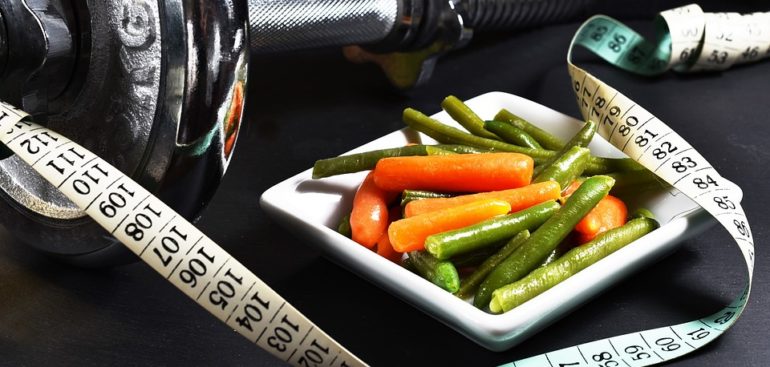It seems like common sense that healthy eating would translate to losing weight.
Yet, many of us have tried eating mainly salads, veggies and chicken breast, but for whatever reason it did not produce the physical changes we were hoping for.
What’s going on?
What does ‘healthy’ even mean?
The term ‘healthy’ (foods) describes foods that contain one or more nutrients that may positively affect the human body when ingested.
Does that mean it’s automatically suitable for burning body fat? No.
Healthy eating and weight loss are usually thought to be one and the same. Although they can be, they are not necessarily.
Here’s what I mean.
Our bodies use food as fuel for energy. In order for our bodies to tap into fat stores for energy and utilize it (fat loss) it needs to ingest less fuel than it requires to function and meet the demands you place on it.
In other words; your body will lose weight when it burns more calories than it consumes.
Therefore, calories are a major variable in fat loss.
“So, can I eat whatever I want as long as it’s in a caloric deficit and still lose weight?”
Technically yes you could, but it is not so cut and dry.
Unless we possess elite genetics that help us metabolize just about any food we eat without hormonal disruption, insulin insensitivity and other important processes that the body must maintain to function optimally, we need to pay close attention to calories AND the type of foods that we eat.
To alleviate confusion, the large majority of us are not blessed with such godly genetics, therefore the “if it fits your macros”(IIFYM) method of dieting may not be the most sustainable to follow.
Calories: Intake vs. Expenditure
Calories are an important factor to pay attention to when fat loss (or muscle building) is the goal. However, the body is significantly more complex than that.
All the incredible systems and processes in our bodies work together as a unit to create one big organism.
That means disrupting any one bodily process will have an overall systemic effect and affect your body as whole.
Eating the foods that are right for you – the ones that your body has an easy time digesting and absorbing – will be your best solution for not only sustainable weight loss but general health as well.
Choosing single ingredient whole foods are at the top of the list since you know exactly what you are eating and are usually nutrient dense. Foods such as rice, sweet potatoes, vegetables, fruits, lean meats and nuts.
Minimize or eliminate any foods that come pre-packaged. Foods that are in boxes, bags as well as processed foods should be avoided.
In addition, avoiding foods that have an ingredient list longer than the line at the Apple store for the new Iphone launch is probably a good idea.
Some examples of foods to avoid: donuts, bags of chips, processed meats, frozen ready-to-go ‘meals’, fast food, sugary foods, fried foods and pastries.
Even if you’re in a caloric deficit at the end of the day or week, eating unhealthy foods (processed, high in sugar, high in trans fat, high in gluten, GMO,etc.) will eventually cause bodily system disruption such as:
- Increased total body inflammation
- Acidic environment
- Hormonal disruptions (higher estrogen, lower testosterone)
- Decreased insulin sensitivity
- Weakens immune system and disrupts digestion
- Lower energy level and overall sluggish feeling
These negative consequences from eating unhealthy foods will greatly impact your health and stagnate weight loss.
The Rule
A good rule to go by is the 90/10 rule. 85/15 works as well depending on how much body-fat you are currently carrying.
The idea is that you eat healthy, nutrient-dense foods 85% or 90% of the time, allowing yourself to enjoy not so healthy but delicious foods 10% to 15% of the time.
This method will help you stay sane, satisfy your taste buds/cravings and still continue to lose weight.
Metabolic Damage
A popular occurrence is when people decide they want to lose weight, they switch from their regular diet to healthy eating.
This alteration, if not monitored, may be too much of a sudden decrease in calories from their regular diet.
For instance, let’s assume that your regular diet consists of breakfast, lunch and dinner. Possibly a daily sugary coffee and the occasional bagel or muffin on the go.
When you switch to healthy eating and instead of a muffin you eat an apple, instead of your regular pizza slice for lunch you have a salad and instead of your regular pasta for dinner you have chicken breast with vegetables.
These substitutions create too much of a deficit, placing you in a low-calorie diet instantly.
When you decrease calories, metabolic down-regulation is inevitable.
Decreasing calories too much, too soon will slow down your metabolism. This creates forces you into a sub-optimal position for sustainable fat loss.
Although you may lose a bit of weight initially, you’ll soon plateau with a very slow metabolism. The moment you begin eating normally again you’ll gain it all back and some.
This should be avoided by increasing the amount of healthy foods you consume daily, so that you’re only in enough of a caloric deficit to maintain a healthy metabolism and still achieve fat loss.
Key points
- Healthy eating does not necessarily translate to fat loss.
- Calories play a major factor in losing weight, but it does not end there.
- Body works systemically as a unit, any disruption will affect the whole.
- Unless genetically blessed, healthy eating coupled with calorie restriction is most optimal for fat loss.


